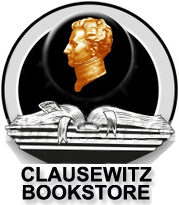
CLAUSEWITZ IN ENGLISH
The Reception of Clausewitz in Britain and America
by Christopher Bassford
Oxford University Press, 1994
FULL TEXT ON-LINE
Table of Contents
Mobile Compatible •
Chapter 20. Assessment, 1914-1945
By 1914, and certainly by 1945, many concepts generally considered "Clausewitzian" had already been absorbed into mainstream English-language military thought, although they did not necessarily get there via Clausewitz. The phrase that "war is a continuation of policy" was common currency even among people whose military understanding was minimal (as is evidenced by its specific negation in the Kellogg-Briand Pact). The importance of moral and psychological factors in war had been common currency long before 1914. The role of "friction" was also widely recognized in theory, although not always under that name. Its organizational implications, however, primarily what we now call Auftragstaktik, do not seem to have been widely recognized or implemented.
The widespread acceptance of these aspects of Clausewitz's approach did not necessarily contribute to a wider or deeper appreciation of their author. Outside the limited sphere of military studies, the dominating elements in mainstream British commentary on Clausewitz were ignorance and hostility deriving from the emotional shock of the First World War and from continuing hostility toward Germany and German militarism. The dominating fact about American commentary is that there was very little of it, until World War Two focused the nation's attention on military concerns. There is little evidence that Clausewitz's work was known (except by his often distorted reputation) to American political leaders or even to political scientists like Quincy Wright.
In the field of military studies, which was dominated by serving soldiers, military journalists, military historians, and--after 1933--refugees from German National Socialism, the picture is more mixed. In Britain, the two most important Anglo-Saxon military theorists of this period, Fuller and Liddell Hart, reflected in varying degrees the hostility that was common in society at large. Fuller eventually got over it, but Liddell Hart did not. Still, both men were intensely aware of the philosopher's work. Cyril Falls, journalist and eventually Chichele professor at Oxford, carried on in the much more positive tradition of his predecessor Spenser Wilkinson, but he lacked Wilkinson's brilliance. F.B. Maurice carried on the positive view of his father, J.F. Maurice.
Whatever the attitude toward him, Clausewitz was clearly an influence in Britain. It is therefore conceivable that Clausewitz's theories did have some fairly direct impact on British military behavior. Many senior British leaders in the Second World War had been impressionable junior officers affected by the burst of interest in Clausewitz that had followed the South African War of 1899-1902. A more immediate impact would have come via the influence of Maurice and Falls, whose derivations from Clausewitz were direct, acknowledged, and frequently operational in nature, and via Liddell Hart and Fuller, for whom Clausewitz's contributions were more thoroughly disguised. Churchill's knowledge of Corbett constitutes an important but undocumentable route for Clausewitz's influence. There is, however, no evidence of any direct interest in Clausewitz among such key figures as Montgomery or the air power theorists.
Among native-born Americans, Clausewitz was the almost exclusive property of a small band of uniformed military intellectuals like Robinson, Burns, Palmer, Joe Greene, and, in the navy, George Meyers. His influence on individual military leaders like Patton and Wedemeyer--though almost certainly real--is impossible to assess. A better assessment can be made in the case of Eisenhower, although the sources available make it more applicable to his role as president (1953-61) than to his operations as a soldier before 1945. Even those writers on Clausewitz who were not professional soldiers--Robert M. Johnston and Hoffman Nickerson--spent time in uniform and identified with the army. Although these American writers had a respectable understanding of On War, their work was not as influential as that of the British writers or as well known outside narrowly military circles.
The indirect transmission of Clausewitz's ideas via his interpreters was unreliable, especially for the American army, which depended largely on German authors like Goltz. The army as an institution was disinclined to accept Clausewitzian ideas on the interrelationship of politics and strategy. The navy benefited from the clearer transmissions of Wilkinson and Corbett and from the fact that on the crucial issue of political control, Clausewitz's views were compatible with Mahan's teachings. It would be difficult, however, to argue that the works of Clausewitz exercised any great practical influence on American military institutions, aside from whatever role Clausewitz had played in creating the broader German military model.
Much of the serious, sophisticated, and positive comment on Clausewitz in English was made by German émigrés, most of whom made their way to the United States. It was these émigrés--Rothfels, Rosinski, Jolles--who laid the basis for the post-World War Two revival of Clausewitz studies. Dominance of American Clausewitz studies by foreigners writing in English would remain the case to a significant degree right up to the present day, although today such foreigners are less likely to be German than Israeli, like Azar Gat and Martin van Creveld.
Given the disparate origins, attitudes, and motivations of the various writers who discussed Clausewitz in English during this period, it is difficult to give any broad characterization to their interpretations. At best it can be called a period of quiet ferment, at worst an era of stagnation in the Anglo-Saxon understanding of the Prussian military philosopher. Nonetheless, by 1945 the stage had been set for a significant renewal in the study of Clausewitz's thought.
Return to the top of this page
Go to Clausewitz in English Table of Contents
Visit ClausewitzStudies.org
Visit the
Clausewitz Bookstores!
 US • UK • France • Germany
US • UK • France • Germany